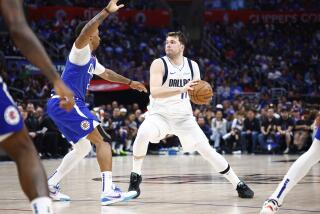Time Warner, Disney Settle Feud With 7-Year Deal
- Share via
Ending a high-profile programming dispute, Time Warner Inc. and Walt Disney Co. signed a multibillion-dollar agreement Thursday under which the nation’s largest cable operator will carry the Disney family of cable channels in exchange for the rights to air ABC on its cable systems nationwide.
The agreement is a victory for Disney, which won several concessions after hard ball tactics by Time Warner backfired earlier this month.
Time Warner, said the agreement will add a couple of pennies a month to cable bills.
Under the deal, Time Warner agreed to carry the Disney Channel as part of its basic cable package rather than making customers pay extra for it like they do for HBO. It also agreed to expand cable carriage of ESPN2, ESPN Classic and ESPNews. In addition, it will launch Toon Disney and the SoapNet and work on two other channel introductions.
Time Warner previously refused to convert Disney Channel to basic because it was unwilling to begin paying the company licensing fees rather than splitting the millions of dollars it now collects from customers. Time Warner said the change would force it to raise prices at a time of stiff competition with satellite TV.
When the two sides failed to reach an agreement by the self-imposed deadline of April 30, Time Warner pulled the ABC signal from its lineup, preventing 3.4 million of its cable subscribers from watching the nation’s top-rated network for about 36 hours.
The incident caused a public uproar and a nightmare for Time Warner in Washington, where regulators are reviewing its pending acquisition by America Online Inc. Regulators ruled that Time Warner was in the wrong and could be fined for the blackout. They also may be more inclined to place conditions on the merger, wary of AOL Time Warner’s power as an Internet and TV gatekeeper.
Time Warner further exacerbated the Washington problem this week with some questionable competitive practices at its Houston operation. Washington regulators criticized the company for paying employees $100 to sign up and then drop a high-speed Internet access service offered by a competitor to find out where it was offered. SBC Communications Inc., which competes with Time Warner’s Roadrunner Web service, filed a complaint with federal regulators, claiming that processing the phony orders was costly.
“Both incidents demonstrate the dangers of monopoly powers,” said Gene Kimmelman, a director of the Washington offices of Consumers Union, an advocacy group.
Under a cease-fire that returned ABC to Time Warner’s systems, the companies agreed to extend their talks until July 15. Time Warner Chairman Gerald Levin then announced at the company’s annual meeting last week that a preliminary agreement had been worked out.
Network executives say Disney’s victory has hidden costs. The company pushed so hard that it has removed one of the most valuable weapons broadcasters have in negotiating so-called retransmission consent agreements with cable operators. Under law, broadcasters can force cable operators to compensate them for the right to retransmit their popular signals, which account for about 50% of cable viewing.
Over the years, broadcasters have used these negotiations to get cable carriage for other channels, such as ESPN2, MSNBC, FX, TV Food Network, the Health Network, National Geographic Channel, TV Food Network and a host of local news channels.
But no longer will broadcasters be able to blackmail cable operators into such rich giveaways by threatening to pull their broadcast signals. After the blackout, Washington regulators warned that they would punish companies that allowed consumers to be inconvenienced because of these kinds of contract disputes.
Thursday’s agreement requires Time Warner, which reaches 12.5 million cable homes, to carry the Disney Channel for seven more years and move it to the company’s expanded basic package by January 2003. Financial terms weren’t disclosed.
Time Warner will also extend distribution of ESPN, ESPN2, ESPN Classic and ESPNews. It agreed to boost ESPN2’s distribution to the same level as ESPN, which reaches more than 70 million homes. It also agreed to carry ESPN Classic to more than 9 million customers and carry ESPNews on all its digital cable systems.
Time Warner also agreed to give Disney an exclusive period to develop two more cable channels. During that time, Time Warner won’t pick up other networks that could substantially compete with those channels.
Time Warner agreed to give SoapNet 6 million subscribers over eight years.
*
* GOTO.COM SUIT: Disney settles by agreeing to pay $21.5 million and change its Go.com logo. C2
More to Read
The biggest entertainment stories
Get our big stories about Hollywood, film, television, music, arts, culture and more right in your inbox as soon as they publish.
You may occasionally receive promotional content from the Los Angeles Times.










